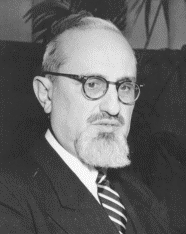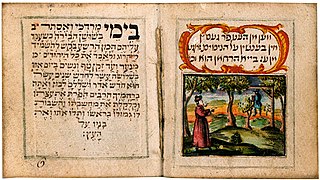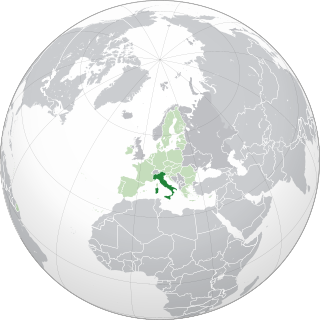Related Research Articles

Judaism is an ethnic religion comprising the collective religious, cultural, and legal tradition and civilization of the Jewish people. Judaism is considered by religious Jews to be the expression of the covenant that God established with the Children of Israel. It encompasses a wide body of texts, practices, theological positions, and forms of organization. The Torah is part of the larger text known as the Tanakh or the Hebrew Bible, and supplemental oral tradition represented by later texts such as the Midrash and the Talmud. With between 14.5 and 17.4 million adherents worldwide, Judaism is the tenth largest religion in the world.
In Judaism, the Seven Laws of Noah, otherwise referred to as the Noahide Laws or the Noachian Laws, are a set of imperatives which, according to the Talmud, were given by God as a binding set of universal moral laws for the "sons of Noah" – that is, all of humanity.

The Talmud is the central text of Rabbinic Judaism and the primary source of Jewish religious law (halakha) and Jewish theology. Until the advent of modernity, in nearly all Jewish communities, the Talmud was the centerpiece of Jewish cultural life and was foundational to "all Jewish thought and aspirations", serving also as "the guide for the daily life" of Jews.

Nisan in the Hebrew and the Babylonian calendars, is the month of the barley ripening and first month of spring. In the Hebrew calendar it is the first month of the ecclesiastical year and the seventh month of the civil year. In the Torah it is called the month of the Aviv. It is a month of 30 days. Nisan usually falls in March–April on the Gregorian calendar. In the Book of Esther in the Tanakh it is referred to as Nisan. Karaite Jews interpret it as referring to the month in which barley was ripe.

Joseph Ber Soloveitchik was a major American Orthodox rabbi, Talmudist, and modern Jewish philosopher. He was a scion of the Lithuanian Jewish Soloveitchik rabbinic dynasty.

Sabbatai Zevi, also spelled Shabbetai Ẓevi, Shabbeṯāy Ṣeḇī, Shabsai Tzvi, and Sabetay Sevi in Turkish, was a Sephardic ordained rabbi from Smyrna. A kabbalist of Romaniote origin, Zevi, who was active throughout the Ottoman Empire, claimed to be the long-awaited Jewish Messiah. He was the founder of the Sabbatean movement, whose followers subsequently were to be known as Dönmeh "converts" or crypto-Jews.

Purim is a Jewish holiday which commemorates the saving of the Jewish people from Haman, an Achaemenid Persian Empire official who was planning to kill all the Jews, as recounted in the Book of Esther.
Islamic–Jewish relations started in the 7th century CE with the origin and spread of Islam in the Arabian peninsula. The two religions share similar values, guidelines, and principles. Islam also incorporates Jewish history as a part of its own. Muslims regard the Children of Israel as an important religious concept in Islam. Moses, the most important prophet of Judaism, is also considered a prophet and messenger in Islam. Moses is mentioned in the Quran more than any other individual, and his life is narrated and recounted more than that of any other prophet. There are approximately 43 references to the Israelites in the Quran, and many in the Hadith. Later rabbinic authorities and Jewish scholars such as Maimonides discussed the relationship between Islam and Jewish law. Maimonides himself, it has been argued, was influenced by Islamic legal thought.
Yeshu is the name of an individual or individuals mentioned in rabbinic literature, which historically has been assumed to be a reference to Jesus when used in the Talmud. The name Yeshu is also used in other sources before and after the completion of the Babylonian Talmud. It is also the modern Israeli spelling of Jesus.

Conversion to Judaism is the process by which non-Jews adopt the Jewish religion and become members of the Jewish ethnoreligious community. It thus resembles both conversion to other religions and naturalization. The procedure and requirements for conversion depend on the sponsoring denomination. A conversion in accordance with the process of a denomination is not a guarantee of recognition by another denomination. A formal conversion is also sometimes undertaken by individuals whose Jewish ancestry is questioned, even if they were raised Jewish, but may not actually be considered Jews according to traditional Jewish law.

African Jewish communities include:
Onkelos, possibly identical to Aquila of Sinope, was a Roman national who converted to Judaism in Tannaic times. He is considered to be the author of the Targum Onkelos.

The history of the Jews in Italy spans more than two thousand years to the present. The Jewish presence in Italy dates to the pre-Christian Roman period and has continued, despite periods of extreme persecution and expulsions, until the present. As of 2019, the estimated core Jewish population in Italy numbers around 45,000.

The Benveniste famiy is an old, noble, rich, and scholarly Jewish family of Narbonne, France and northern Spain from the 11th century. The family was present in the 11th to the 15th centuries in Hachmei Provence, France, Barcelona, Aragon and Castile Spain.
Torah Umesorah – National Society for Hebrew Day Schools is an Orthodox Jewish educational charity based in the United States that promotes Torah-based Jewish religious education in North America by supporting and developing a loosely affiliated network independent private Jewish day schools.
Yechiel ben Joseph of Paris or Jehiel of Paris, called Sire Vives in French and Vivus Meldensis in Latin, was a major Talmudic scholar and Tosafist from northern France, father-in-law of Isaac ben Joseph of Corbeil. He was a disciple of Rabbi Judah Messer Leon, and succeeded him in 1225 as head of the Yeshiva of Paris, which then boasted some 300 students; his best known student was Meir of Rothenburg. He is the author of many Tosafot.
Pablo Christiani was a Sephardic Jew who, having converted to Christianity, used his position as a Dominican friar to endeavor to convert other Jews in Europe to Roman Catholicism.
This timeline of antisemitism chronicles the facts of antisemitism, hostile actions or discrimination against Jews as a religious or ethnic group. It includes events in the history of antisemitic thought, actions taken to combat or relieve the effects of antisemitism, and events that affected the prevalence of antisemitism in later years. The history of antisemitism can be traced from ancient times to the present day.

Joshua is a given name derived from the Hebrew Yehoshua, prominently belonging to Joshua, an early Hebrew leader of the Exodus period who has a major role in several books of the Bible. The name was a common alternative form of the name יֵשׁוּעַ – yēšūă which corresponds to the Greek spelling Ἰησοῦς (Iesous), from which, through the Latin Iesus, comes the English spelling Jesus.
The following outline is provided as an overview of and topical guide to Judaism:
References
-
 This article incorporates text from a publication now in the public domain : Louis Ginzberg and Isaac Broydé (1901–1906). "Cantori, Joshua dei". In Singer, Isidore; et al. (eds.). The Jewish Encyclopedia . New York: Funk & Wagnalls.
This article incorporates text from a publication now in the public domain : Louis Ginzberg and Isaac Broydé (1901–1906). "Cantori, Joshua dei". In Singer, Isidore; et al. (eds.). The Jewish Encyclopedia . New York: Funk & Wagnalls.